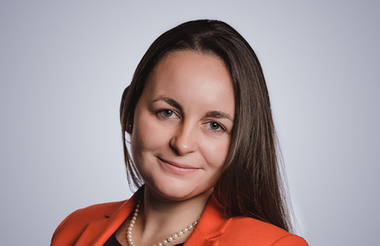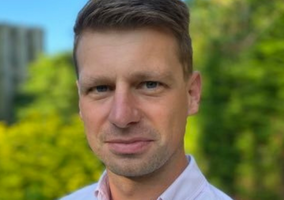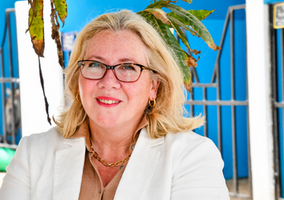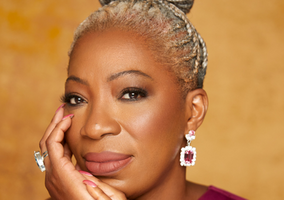The National Emergencies Trust was set up in 2019, after a recommendation from the Charity Commission, to respond to a growing number of crises.
After the Manchester Arena bombing, the Grenfell Tower fire, and the terror attacks in London at Westminster Bridge and London Bridge, there was massive public support for charities responding to the disasters.
Many felt an organisation which took a fast and coordinated approach to raising and sharing funds could be a helpful part of crisis response, and could help tackle instances of fraud.
Mhairi Sharp originally joined as the Trust’s chief operating officer and has been its chief executive since September 2020.
Sharp says there was “a gap in the market” that led to the Trust’s creation.
“When you describe the Trust, even in the very early days, people always say ‘I can't believe that this doesn’t already exist’.”
From the Army to the charity sector
Sharp had a career as part of the British Army for more than eight years, and after her military career was cut short due to injury, she joined the charity sector, first joining the Jubilee Sailing Trust in 2016.
Her experience in the Army was part of her reason for joining the National Emergencies Trust, as former British Army chair of general staff Richard Dannatt is its chair.
“People in the sector can relate to the fact that working in the charity sector is more than a day job – you live and breathe the mission.
“For the Trust this of course means supporting people impacted by emergencies, supporting survivors to rebuild their lives, and that is a cause that you can get passionate about quite easily.”
“The other reason was the opportunity to work with General Lord Dannatt, probably one of the most renowned leaders of our time, the former head of the British Army.”
Sharp adds the skills she learnt in the Army are quite transferable. They include “the ability to not use too many words when they are not needed”, to make decisions quickly, and the confidence to make decisions – “which is all really needed in an emergency situation”.
Launching its first campaigns
One of the big challenges in the early days of the Trust was all around brand presence.
“No one's ever heard of you. Is anyone going to take us seriously? We have a very serious job to do. How do we gain that credibility? How do we raise funds and get them out there equitably?”
When the charity launched its first appeal, at four months old, Sharp says attracting donors did not end up seeming to be a problem.
“The £100m flowed in,” she says. “The mission resonated with them, the mission was clear, and they knew the need was there.”
‘Flexible working has enabled us to keep hold of staff’
Sharp says being a young charity means there are less barriers to the Trust being an equitable and inclusive organisation.
“You’ve got no historic policies, no red tape getting in the way, no one to blame, no excuses, and we quite like to lead from the front.
“We have got diversity across the team, across the board as well. We promote equality through our recruitment processes – we show the salary and we have got CV free intern recruitment. Also, we offer true flexible working.”
“So, you will hear many parents in the team at the 10am meeting saying ‘I am not coming to meetings between these times because I am picking up the kids from school’, and they are really proud to announce that, not worried about what others will think.”
“The flexi-working has allowed us to not only recruit the best people, but keep hold of them.”
‘We need friends across the sector’
Since its inception, Sharp says the charity’s networks have grown massively, and she says these are key.
“We don’t really exist without the rest of the sector. We are not experts in mental health, we’re not experts in domestic violence – we are meant to be the expert in getting money in and distributing it equitably.
“To do that we need friends across the sector, so making friends before we need them is central to our strategy.”
Sharp suggests the coronavirus pandemic highlighted the power of the charity sector. She says it was seen to be needed and gained more credibility.
Other sectors “understand the power the sector has to really make a difference, we are being invited to the table a lot more than we would have been pre-Covid”, she says.
Increasing difficulty to raise core costs
Sharp says: “A lot of people knock on our door and ask us if we’re going to launch an appeal for the cost-of-living crisis, and we have looked at it many times through the lens of our activation criteria.
“We work in a similar way to the Disaster Emergency Committee, so we have very strict criteria, and we are not seeing that propensity to give, which would help us to activate.
“However, what many people do not know is that when an emergency does not reach our threshold, we actually support other emergency appeals. So we’re currently supporting Community Foundation’s crowdfunder and Coop with their cost-of-living crisis appeals.
“Another impact of the crisis is on our own ability to raise core funds. We were in an okay position, but it’s much more difficult now to raise funds for our core costs compared to when we were an unknown charity four years ago, which is very telling of the times.”
Related Articles












